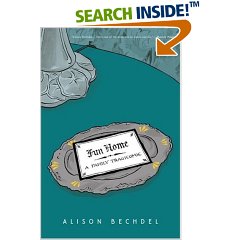
Alison Bechdel's new graphic memoir, Fun Home: A Family Tragicomic, has been getting quite a bit of buzz from various quarters, and with good reason. An engrossing, sensitive narrative, Fun Home has restored my faith in the memoir as quality, worthwhile reading. Often ironic, realistically drawn with bluish-green tinged panels and perfectly paced, Bechdel has created a work that goes beyond the dynamics of her particular family to the more universal theme of a child trying to understand who their parents are and how they have shaped their lives.
The title ironically refers not to the Victorian Gothic revival house that Bechdel's father obsessively restored, but to the funeral home that he ran to supplement his income as an English teacher. At the same time that he's agonizing over William Morris wallpaper, his daughter, Alison, is struggling with her own obsessive behavior in the stultified atmosphere of the house. As Alison reaches adolescence, her growing sense of self and budding sexuality coincides with some revelations about her father's own closeted homosexuality. Gradually, Bechdel's father starts sharing his favorite books with her, leading to a tacit understanding between the two.
 Bechdel (creator of the comic strip Dykes To Watch Out For) considers her life while making references to some of the books that her father recommends. Touching on Ulysses, the myth of Icarus and Colette's autobiography Earthly Paradise, it becomes clear that books are the common ground between Bechdel and her father, where they can understand each other.
Bechdel (creator of the comic strip Dykes To Watch Out For) considers her life while making references to some of the books that her father recommends. Touching on Ulysses, the myth of Icarus and Colette's autobiography Earthly Paradise, it becomes clear that books are the common ground between Bechdel and her father, where they can understand each other.Bechdel's story works very well in a graphic format, and her images convey tensions more tellingly than paragraphs of prose could. The concluding pages may not ultimately answer Bechdel's questions about who her father was, but the final frames have a closing acceptance and ultimate peacefulness. It's a satisfying end to a work of quiet strength.
.jpg)
No comments:
Post a Comment